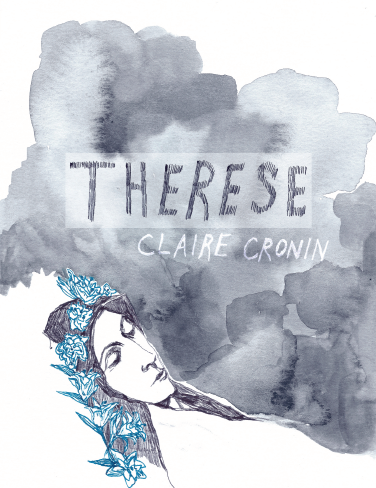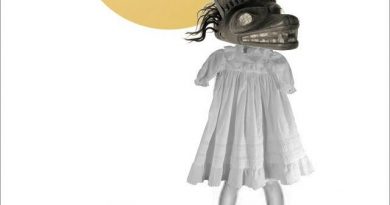Bad Baby by Abigail Welhouse
– Reviewed by Becky Varley–Winter –
With its pink cover and skull-&-crossbones, Abigail Welhouse’s Bad Baby announces itself as a bold splash of colour. The opening poem is not, for me, the strongest representation of her work as a whole, which is more subtle: babies aren’t usually thought of as ‘bad’, but this baby is, geddit? This baby “will kick you in the eyes and laugh”, this baby orders pizza and dances on hospital beds, and nobody will ever know, because it’s a baby, innocent and without intent (of course, babies don’t order pizza). It’s an ear-catching title for the pamphlet, but as a joke it’s one-note, coming off a little predictably. However, the implications have potential: the idea of ambush, surprise, feigned innocence, the poet acting as a kind of ‘bad baby’. I’m happy to leaf on.
The second poem, ‘Free Onions’, is more intriguing: piles of onions stand in for a weight of uncomfortable emotion or lack-of-emotion, useful at funerals “when you can’t cry but want to”. The speaker’s face is “distorted”, the onions marking feelings of conspicuousness and difference, discomfort. Welhouse ends with a segue to:
If you wear a blindfold and bite an onion,
does it taste like the sun?
The obvious response is, well, no, it tastes like an onion. However, the idea of the sun – fierce unbearable heat – is a culmination of the rest of the piece, turning on strange sensations, an intensity or conflict that’s too hot to handle, the poem edging around it.
Non-sequiturs – questions with answers that seemingly don’t correspond to the question – are a running theme, generating unexpectedness, e.g. in ‘Q & A’:
Question: She is a mermaid. Why is she little?
Answer: The pine trees experience a kind of hybrid vigor during the
summer months. The sky receives open-heart surgery to alleviate
varicose veins.
This poem plays with nonsense, the kinds of rules found in fairy tales which create their own patterns and traditions: tacitly obeyed systems of three and seven, and magical objects that exist only to solve the story’s needs. “He is a dwarf. Are there seven?” By juxtaposing fairytale tropes with quasi-facts and the language of academic debate, Welhouse perhaps suggests those systems as similarly constructed and incantatory semblances of sense.
‘Scent of a Man’ does something like this, too, with the language of advertising and desire:
A man distances sweet and savoury.
A man’s terrific caramelized sugar.
Ideal if you cost the same and smell better.
This humorously imaginative mode is broken by poems like ‘Return from Suburbia’ – a love poem to the city – and ‘Birds, Teeth’, which quietly records belief systems that both create and resist cohesion, with a clear-eyed gaze at other people and a diary-like atmosphere:
Today: Jenni and Libby ask strangers on the street if they can pray for
them. They usually can.Libby wants to buy a mattress from a child. She’s ready for God to
bring her husband, she says. Her white dog barks in a cage. I ask if I
can hold him.She shakes her head. “He killed a bird today. Right there on the
porch. We prayed that God would raise the bird, but He didn’t.Jenni tells me:
God cured jaws.
God cured milk.
But not bird. Never bird.
Something in this poem moves me and feels real; it sticks with me after I close the book. ‘Netting’ is about violence, with an angry undertow, and is similarly pitched somewhere between poem and (very) short story. ‘Stars Not Where They Seemed’ states “our calculations were off”: Abigail Welhouse tends to focus on things slightly askew, not completely fitting together. Given this, her poems don’t follow set forms, avoiding the ornate as much as the portentious and the pristine: they’re disjunctive, prosey, with lots of full stops. This isn’t to say they lack care: it is very difficult to achieve being seemingly very casual, while still being able to demand the reader’s attention and affect them strongly. Some poems do this better than others. ‘Cows, Mad’ could feel completely random, refusing to commit to a particular line of feeling or thought, or it could feel refreshing, depending on your taste (I fluctuate between these two positions):
I always end in death,
but whatever,
doesn’t everyone?Inject me into a monkey brain
then eat me and see what happens.
Do it! I dare you. Do it do it do it.
There is a kind of friction here, a happy pick ‘n’ mix attitude, dressing up in different outfits: e.g. in ‘Purple Lipstick Goth Breath’, “in the makeup aisle, I’ll pick things / up and put them down. […] O fancy face gunk, save me from myself and my city.” I enjoy this cheerfulness – there is sometimes so much heaviness in poetry – but the pamphlet is strengthened by moments in which levity is leavened with a willingness to be vulnerable. ‘Moving’ is, well, moving:
At 24, she tells a man while drunk,
“You’d look good with a beard.”
He grows one and helps her move to the ocean.Alone, she finds she loves
the tick of clocks,
the growl of waves,
the sizzle of olive oil on the stove.
In these touches of tenderness, directness and realism, Bad Baby avoids the so-what-ness that persistent irony otherwise risks. ‘Dawson Gets A Haircut’ is trendy but touching, while ‘New Rituals’ offers a litany of small comforts and ways-to-be-happy (“Tell people when they’re magnificent, and why”). ‘Royalty’ ambitiously attempts to synthesise a contemporary moment which is all about distraction, comfort, consumerism and entertainment, switching from full stops to commas, which increases its flow:
[…] millions of people have paid for
you to learn how to read and paved the roads for you to drive to
people that you think about that will leave you and your heart will
break but they’ll give you their chairs, or a rice cooker, or some spices
that will feed you when combined with cheese from your magical
refrigerated box, which back then would have gotten you burned
as a witch. I forgot to mention: They’ll also pay to send you to war.
There is a quiet presence to the final poem, ‘Stable’, about tending to horses, being both nurturer and breaker of them. This is a strong end note in a young, curious pamphlet, in which Welhouse seems to be trying different strategies out, tasting and experimenting, tempting the poems into view like skittish horses:
These horses welcome me, then run.
I am the rubber of ears,
bringer of apples,
healer of welts.I am the tightener of girths,
inserter of metal,
puller of reins.
I ask them to bend.





